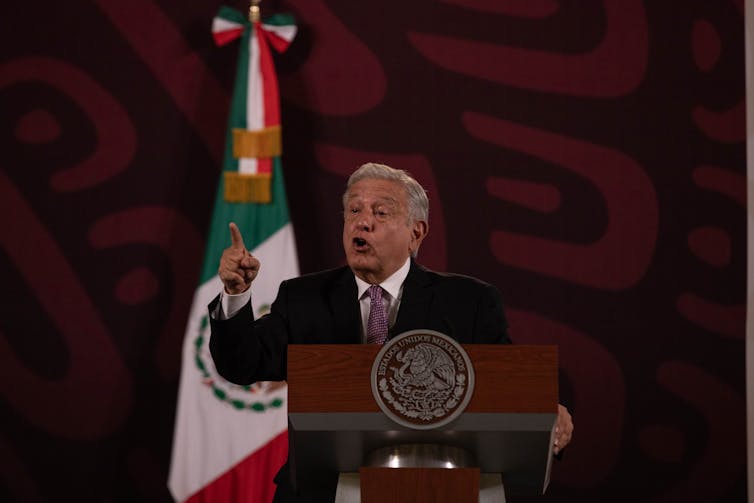Tens of millions of Mexicans will go to the polls on June 2 to vote in the country’s largest election in history. The election will allow voters to decide more than 20,700 positions at the local and national levels.
This election has certainly been one of contrasts. It has become Mexico’s most violent election season on record, marred by the killing of dozens of candidates. But, at the same time, the country looks set to elect its first woman president.
The two women leading the contest are Claudia Sheinbaum from the incumbent left-leaning Morena party and Xóchitl Gálvez, who is the pick of Mexico’s opposition coalition. The only man in the presidential race, Jorge Álvarez Máynez, is trailing behind.
In a country where gender-based violence is prevalent, having two women compete for the executive office is newsworthy. But it is not entirely surprising.
Women’s political participation in Mexico has been on the rise since the passing of a gender quota law in 2002. The law prohibited political parties from having more than 70% of their electoral candidates from the same gender. The quota system evolved into a constitutional reform in 2019 that required gender parity in the executive, legislative and judicial branches.
Mexico now has the highest percentage of female legislators in parliament of any democracy in the world. And more women voted than men in Mexico’s last presidential election in 2018.
Sheinbaum is comfortably ahead in the polls and looks set to beat Gálvez to the top position. But the question remains: will Sheinbaum be able to implement her own agenda if she becomes president?
The main candidates
Sheinbaum, who was born into a well-off family of Jewish heritage in Mexico City, began her career in academia. Her transition into politics came in 2000, when she was appointed Mexico City’s environmental secretary by current president Andrés Manuel López Obrador (who is more commonly known by his initials Amlo) a week after he became the city’s mayor.
She would later become the head of the local government in the Tlalpan district of Mexico City in 2015. Then, in 2018, she was the first woman to be elected as the mayor of Mexico City.
Her main rival, Gálvez, daughter of an indigenous father and a mixed-raced mother, grew up in a poor rural town of Tepatepec in the state of Hidalgo and moved to Mexico City at the age of 16. She initially worked there as a telephone operator before earning a scholarship to study computer engineering at the National Autonomous University of Mexico. She became a successful entrepreneur, founding a number of high tech companies.
Gálvez entered politics in 2000 under the government of Vicente Fox, the first president to be elected following the end of the Institutional Revolutionary Party’s reign after 71 years. She was then elected as mayor of Miguel Hidalgo district in Mexico City, and in 2018 she was elected to the Senate.
Over the course of his term, Amlo has been a very popular president, commanding an approval rating as high as 64%. His popularity largely stems from his success in rolling out generous social welfare programmes, which have been based on unconditional cash transfers to low-income households.
But Mexico’s electoral law does not allow for a president to be reelected after their six-year term. So Sheinbaum is looking to capitalise on her predecessor’s popularity and has based her campaign on continuing with the government’s welfare programmes, rather than proposing more changes.
Gálvez has also said she will continue the current welfare programmes, understanding the widespread support for them. However, her campaign has been focused on criticising the current president. This could explain why around 40% of people in the latest polls say they hold a negative opinion of her.

Whoever wins the election will face serious monetary constraints. The increase in public spending under Amlo’s administration has increased the government deficit from 2% to 6% of GDP.
Alongside his social welfare programmes, Amlo has also made some substantial public infrastructure investments. The government is spending vast sums of money on an oil refinery, a national airline, and an airport.
Analysts argue that these projects will not bring in enough revenue to justify the amount spent on them, and say they will limit the manoeuvring room of the next administration. The next president will probably need to raise taxes or decrease spending in order to pay the government’s debt – a move that will be unpopular among Mexican voters.
Sheinbaum has said that she will continue with all of the current government’s programmes. But that remains to be seen. Academics hope that she will support higher education and international research, which have been placed under siege by Amlo’s government. And women are hoping that she will take gender-based violence more seriously than Amlo, who has openly mocked it.
Amlo has also proposed broad constitutional reforms, including an overhaul of the judicial and electoral systems and a programme to militarise Mexico’s national guard. Sheinbaum has vowed to support the reforms and change the constitution accordingly should her party win the election and a parliamentary majority needed to do so. Rights groups say that the reforms could weaken Mexico’s democracy and have a negative effect on human rights.
Regardless of who wins on June 2, Mexicans will have elected their first female president. Whether they will have the room to act as they please is much less clear.

